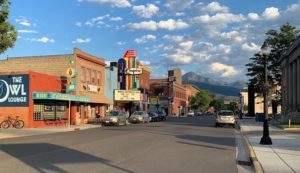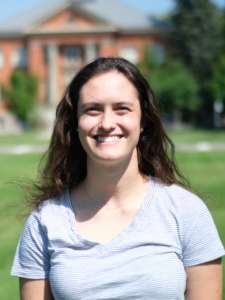Looking Back on my First Half of AmeriCorps Service by Katherine Fazekas

On August 10th, 2022, I packed my car to begin a 5 day solo journey from Boston, MA to Missoula, MT for pre-service orientation with Montana Campus Compact. Though I had never been to Montana, I eagerly accepted a position as a VISTA with Park County Environmental Council in Livingston. After a tumultuous college experience that consisted of two semesters completed from my brothers’ childhood bedroom and three joint surgeries, I was in need of change. Having completed a demanding degree at a rigorous college with a competitive, intense atmosphere, I felt like I was on a treadmill from school to job to more school chasing societal success. I was keeping up, but at the demise of my own happiness. The feeling of doom that accompanied the thought I may be sacrificing my own fulfillment due to external pressure caused me to take a leap of faith- I knew that after completing my degree, rather than moving directly into the workforce or more school, I wanted to take a moment to breathe- to listen to myself, discover my own passions, and be assured that whatever step I take next is of my own desire and excitement. I have always had an intense love for nature and been fulfilled by service experiences. Therefore, when I came across the opportunity to volunteer with an environmental non-profit, it seemed like destiny.
Now 6 months later, I completely stand behind my decision. Park County and my host organization are an amazing fit. I’m privileged to live in a beautiful place, and be part of a workplace full of caring and intelligent individuals who collaborate with equality and togetherness.
However, I would be remiss not to mention how difficult service is at the same time. This is largely due to how immense of a transition I have been undertaking. Switching from an undergraduate chemistry degree to serving at an environmental non-profit has been a huge change that at some times has felt like a rewiring of my brain. In college, my days were ruled by classes to attend and deadlines to meet. The pressure was always on, it was clear what needed to be done, there were classmates working alongside you, and there was clear and constant feedback in the form of grading. This year I have found myself in a near polar opposite situation. The organization I serve at is relaxed and hands off. Rather than being told explicitly what to do and when, I have one large project to navigate. And though my coworkers are excellent, we often work remotely and separately on very different projects. Due to these very different circumstances I have found it is easy to feel lost, unmotivated, distracted, or discouraged. Out of the difficulty, though, I feel that I’ve learned lessons that I continue to lean on when the going gets tough…
Making a mountain into molehills
With a large project, the uncertainty of what to do next, or anxiety I have about executing it can manifest into a state of paralysis, in which I feel a lack of motivation and end up resorting to inactivity. And as someone who is used to consistently delivering high-level outputs, inactivity is extremely frustrating.
What I have learned so far is to break up large overwhelming projects into small achievable goals. Rather than work on a year long timescale, I have found that working with 1-2 week objectives makes tasks digestible and manageable.
In addition to changing my approach, I have also been trying to change my mindset. Being the first to work on the project, I have been trying to adopt the mindset that everything I have done is progress, rather than focusing on everything there is left to do. This way, I can be motivated by my success rather than intimidated by what is left.
Change happens slowly…
Another cause of frustration is that the realistic timescale of the project I’m working on is 2-3 years so there are not many tangible outputs to see. This has made me be realistic about what achievements to expect- rather than weekly outputs I work towards monthly and yearly building blocks to a greater goal. This has forced me to slow down my expectations for measurable milestones, outputs, and feedback. While this is difficult for me to do I think it is a valuable realization to make on both a personal and professional basis.
Becoming comfortable with qualitative progress
As a chemistry major, I’m definitely science minded and data-driven. I’m used to measuring progress by the number of reactions completed or tests taken, as well as the visual and numerical markers that come with grading. In my current role, the main markers of progress are relationship building and independent learning, which are very difficult to quantitate. I must continually remind myself that active relationship building is imperative to the success of a community planning project.
The ED of my host site has joked “how do we show success? By the number of lunches we’ve had? Cups of coffee?”
But there is truth to that! People are far more willing to work together if you make the time and effort to get to know them and show you care about them.
So again, I have been trying to step out of my comfort zone and trust that while it may not come in a number, I am making progress.
Fake it til you make it
Another significant challenge this year has been the sense of imposter syndrome, and the fear of rejection that accompanies it. As a 22 year old female who is not from Montana, and is working on a completely new project, I have a fear that when I step into meetings, I will be dismissed as invalid. Most of the people I meet with are at least a decade older than me. What business do I have convincing them my work matters? Or trying to organize them to work at it?
When I began meeting with people, I was pleasantly surprised at how receptive they were! They did not dismiss me at all, and lent their expertise and ideas with excitement.
Despite this positive feedback, the feelings of doubt still lurk. I have found that the best way to manage this is to fake it. Sometimes when I’m feeling uncertain or not confident, I create a separate persona who is always sociable, highly intelligent, and will convince people to care. I believe that if I keep “pretending” to be this person, I will become more confident and successful.
Lastly… lean on your friends (and their dogs)
Without a doubt, serving in a completely new place at a new project can be difficult for all the reasons above. On top of that, being a young person in a small rural community with an older demographic can be lonely at times. From these realities, I’ve learned the importance of leaning on my community, and finding community in all different ages.
One of the highlights of my service year is how strong and vibrant the Livingston and Park County communities are. I’ve found community in some very unexpected places, and these relationships energize me and make me excited to keep serving here.
For example, I have made great connections with many of my coworkers at my service site. We have many similar interests and are always looking to get together whether that is hiking, biking, or skiing.
Another unexpected but amazing community I have found is that of my outdoor hockey league. I heard through word of mouth of an outdoor pickup league in the area, and one day showed up solo at the pond to play. I was immediately welcomed and this has now become a weekly part of my life. Hockey has always been a source of connection in my life as well as a setting in which I feel most comfortable and confident. I really do not know if I would have shown up to a random pond solo if for any other cause, but with hockey I had no second thought. And I’m incredibly thankful I did. I definitely did not expect to be friends with a group of 60 year old men, but I have the time of my life twice a week playing hockey in the best possible ways- outdoor pickup for the love of the game.
In addition to my geographic community, I’ve formed a wonderful friendship with the VISTAs in Livingston and Bozeman. It’s very comforting to have friends who can be in solidarity with your experience- and this has caused us to be fast friends!
Lastly, I have always been a HUGE dog lover- I love dogs more than most people, including myself. Dogs have been constant pockets of joy in my service term. From the first day of service when I learned we have a dog-friendly office to occasional pet-sitting gigs, four legged friends have provided the energy for me to get through on the hard days.
Despite the challenges, I am very grateful for all the lessons I’ve learned so far- having patience, leaning on my community, and being persistent are all traits that will allow me to succeed and be fulfilled well beyond this year!

 Blog
Blog